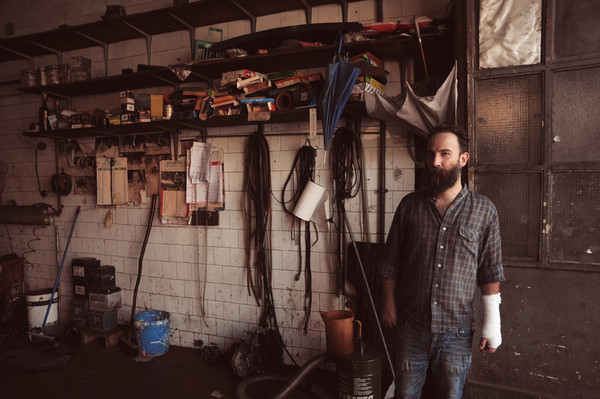
By the releasing of INLAND, Zhu Wenbo did a short interview with Dominique Vaccaro by email, about his music creating and inspiration.
Z: Would you like to introduce yourself? Where did you grow up and where are you living now? What kind of music influenced you a lot or brought you inspiration?
D: I grew up in south Italy but i live in Bologna since long time.
I’m self-taught. I started playing guitar when i was 12, listening a lot of blues men from my dad’s record collection. But i also dug other kinds of music, trying to learn as much as I could to be able to form a personal taste.
Firmly determined to create soundtrack-like music, i started using a double deck stereo cassette recorder, to overlay and mix guitars and any other sound.
But I had to wait until I moved to Bologna to study Painting at the Fine Art Academy, to hear about Musique Concrète.
The great Luc Ferrari came to town once, for a sound diffusion: it’s been a game changer for me.
Z: Before this cassette, I have listened all your other albums and I really enjoyed them. I found that you used loops (reel-to-reel, cassette, digital…). When did you start using this method? How does loop attract you?
D: I always used cassettes tapes to record but also to use them as tools to make sounds but i started using tape loops more often, after seeing a live set of Jérôme Noetinger and Lionel Marchetti. Amazing tapestry and sound tricks!
My friends Luciano Maggiore and Valerio Tricoli were using both a Revox Reel to Reel tape recorder to produce sounds and to perform with, so i bought one and started doing my first attempts with long length tape loops. It’s been good to have other people around that we’re using the reel to reel tape recorder. We could discuss solutions and problems, practicing and learning.
Z: I found that all your tracks are very short. Many of them are just one or two minutes. Why you always make short tracks? Because for experimental music, most of them are long tracks, some of them are very long.
D: In the past i was used to produce longer pieces but there was something off with my attempts. So i started rethinking my approach. For years i just played mainly guitar, in solo sets or in bands, though i never really stopped recording weird sounds, mostly coming from tape manipulation. After this hiatus, that lasted some years, back home from a European tour with a punk rock band, i felt the need again to do some tape based music and i wanted that to be, direct, simple and short like some of the first Études of Pierre Schaeffer.
I tried to focus more on the recorded sounds themselves in relation with each other in the space than with the eventual dramatic result that a long track can suggest.
That’s why all my latest productions have this characteristic. You can think of them as postcards from dream-like places you have never been or as inner places you cannot quite understand (i think this especially in INLAND). By the way, i’ve never thought that experimental music is or should necessarily be made of long tracks. I also can’t say I’m sticking to this plan forever.
Z: I’m also curious to the titles. Is there any meanings to the numbers you use for tracks? I found there are irregular numbers on Close Distances and Overlapped Memories.
D: There are no titles, no meaning at all. It’s just the serial number of the raw recorded material. All chapters of the same main concept.
Z: You also have a guitar project J.H. Guraj. It sound totally different to your loop-tape project. Do you think if there is any links between these two different projects?
D: it just depends of what i want to express and through what medium my intentions will be better exposed. I don’t believe in borders by any means: I’m interested in different kinds of music and art. there’s no limit. Both approaches are higly connected through my way of recording and mixing, trying to balance the space between sounds and trying to enhance the perception of each sound in relation with the others and with the space itself.
Z: Is it easy for your loop-tape project to do performance?
D: It’s not that difficult to do. It depends on what you want to use to improvise, though it’s been a while that i’m not performing any electroacoustic set.
At the moment, i’m mostly recording, enjoying the studio work, and publishing.
Z: Will it be different between live performance and studio?
D: There are differences between the two, yes: studio time is a way calmer and reflective moment. Live improv sessions can turn highly wild and psychedelic sometimes.
Z: Beside of music, do you have other interests?
D: i love walking inland…
在准备《内陆》这张专辑发行的期间,朱文博和Dominique Vaccaro做了一次简短的采访。起初他是有些抗拒的,但最终还是决定来回答这些问题。似乎之前没有在什么地方刊登过他的采访?希望你可以通过这几个简单问题对这位低调的音乐人有更多的了解,进而喜欢上他的音乐。
朱:你愿意介绍一下自己吗?你在哪里长大,你现在住在哪里?什么样的音乐影响了你,或者给予了你灵感?
多米尼克:我在意大利的南方长大,但已经在博洛尼亚生活了很久了。
我是自学的。我12岁开始弹吉他,那时候从我爸爸的唱片里听到了很多的布鲁斯音乐家。但也探索其它各种音乐,从自己的口味尽可能地去学习更多。
下定决心想要做一些像是电影原声那样的音乐,我开始用一台双卡座立体声磁带机叠录一些声音,把吉他还有别的声音混在一起。
但更多的还要等到我去博洛尼亚的美术学院学习绘画。在那里我听到了具体音乐。伟大的Luc Ferrari来过一次,它改变了我的游戏规则。
朱:在出这张磁带之前,我听了你所有的专辑,非常喜欢。你使用loop,包括开盘带,卡带,还有数字loop。你是什么时候开始用这种方式的?Loop在哪些地方吸引了你?
多米尼克:我一直用卡带来录音,但也会用它们作为工具来制作声音。但是在看过一次Jérôme Noetinger和Lionel Marchetti的演出之后,我开始更经常使用磁带loop。他们磁带设置与声音技巧太过精彩了!
我的朋友Luciano Maggiore和Valerio Tricoli使用Revox开盘机,用它来制造声音也用它来演出。所以我也买了一台,开始尝试很长的磁带loop。周围也有使用开盘机的人会很棒,我们可以一起讨论/解决问题,练习并学习。
朱:我发现你的曲目都很短。很多时候就是一两分钟。你为什么总是做这种短曲目?问这个问题是因为,很多实验音乐都挺长的,而且其中有一些特别长。
多米尼克:在以前我也会做更长的曲目,但我的尝试有些不对劲。所以我开始重新思考我的方式。有那么一些年我主要就是弹吉他,独奏或乐队,但我其实也并没有真的停止用磁带录制怪异声音的计划。这种情况持续了一些年。但有一次我和一支朋克乐队一起欧洲巡演,结束回家之后,我决定继续做一些磁带音乐。我想要直接、简单、短小,就像是皮埃尔·谢弗最早的那些练习曲。
我试着更多去关注所录制的声音本身在空间中的相互关系,而不是一首长音轨所暗示的,最终会有一个戏剧性的结果。这也是为什么我最近的作品都有这种特征。你可以将其当作是一些明信片,来自一些你从未去过的梦幻般地方,或一些你自己也无法理解的内心世界(《内陆》这张特别是这样)。另外也说一下,我从来不觉得实验音乐就得是很长的。同时我也不认为我自己会一直是这种方式。
朱:我对标题也很好奇。这些曲目所使用的数字有什么含义吗?因为我在“Close Distances”和 “Overlapped Memories”这两张专辑里也发现了这些随机的数字。
多米尼克:标题并没有意义。它们只是原始录音素材的序列号。所有的章节都有着同样的概念。
朱:你还有一个主要是吉他的项目J.H. Guraj,它听起来和你的磁带loop项目完全不一样。你觉得这两个项目之间有怎样的联系吗?
多米尼克:这只是取决于我想要表达什么,以及通过怎样的媒介可以更好地表达。对于任何意义上的边界我都是不相信的——我对各种不同的音乐和艺术感兴趣,并没有限制。这两个项目通过我的录音和混音方式紧密相连,都是试着去平衡声音之间的空间,并增强每种声音相对于其他声音以及空间本身的感知。
朱:你的磁带loop项目做演出容易吗?
多米尼克:并没有那么难。这取决于你想要用什么来即兴。虽然确实有一段时间我没有演过电子原声的项目了。目前我主要是沉浸于在工作室的录音,以及出版。
朱:录音室会和现场演出有所不同吗?
多米尼克:的确是有不同。工作室里的时间是一种平静与反思,而现场的即兴有时会变得非常狂野,迷幻。
朱:音乐之外,你有什么别的兴趣吗?
多米尼克:我喜欢在内陆行走。
